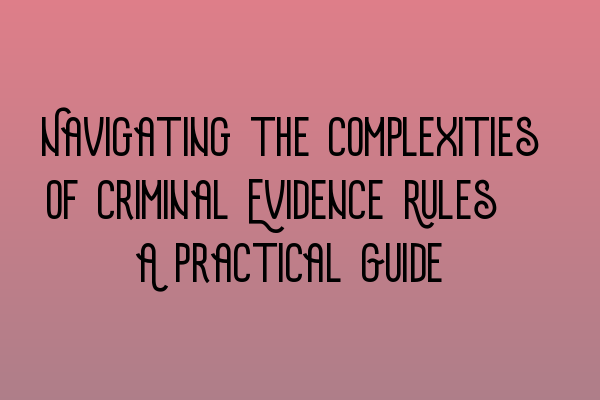Navigating the Complexities of Criminal Evidence Rules: A Practical Guide
Welcome to SQE Criminal Law & Practice Law UK, your trusted resource for all things related to criminal law. In this blog post, we will provide you with a practical guide to navigating the complexities of criminal evidence rules. Understanding these rules is essential for every solicitor and legal professional involved in criminal proceedings. So let’s dive in and explore this important topic!
Why are Criminal Evidence Rules Important?
Before we delve into the intricacies of criminal evidence rules, it is crucial to understand their significance in the legal landscape. Criminal evidence rules establish the standards and procedures for what evidence can be presented in court and how it should be presented. These rules ensure fairness, protect the rights of the accused, and contribute to the overall integrity of the criminal justice system.
The Challenges of Navigating Criminal Evidence Rules
Navigating criminal evidence rules can be a daunting task. The legal framework is complex, and the rules themselves can vary depending on the jurisdiction and the type of case involved. Staying up-to-date with the latest amendments and understanding how they apply to specific scenarios requires diligent research and constant learning.
One of the biggest challenges faced by solicitors is identifying relevant evidence and understanding its admissibility. Criminal evidence rules dictate the criteria for admissibility, such as relevance, reliability, and legality. Failure to comply with these rules can result in crucial evidence being excluded from court proceedings, potentially jeopardizing the outcome of the case.
A Practical Guide to Navigating Criminal Evidence Rules
To help you navigate the complexities of criminal evidence rules, we have prepared a practical guide with essential tips and best practices:
- Familiarize Yourself with The Law: Start by gaining a comprehensive understanding of the relevant legislation and case law. This will provide you with the foundation necessary to navigate through the complexities of criminal evidence rules effectively.
- Stay Updated: Criminal evidence rules are constantly evolving, so it is essential to stay updated with the latest developments. Regularly review recent cases, legislation amendments, and legal commentaries to ensure you are well-informed.
- Understand the Burden of Proof: The burden of proof lies with the prosecution in criminal cases. As a solicitor, it is crucial to understand the standards of proof required to establish guilt beyond a reasonable doubt. This understanding will guide you in evaluating and presenting evidence to support your case.
- Evaluate Evidence for Admissibility: Carefully evaluate the evidence you intend to present in court. Determine its relevance, reliability, and whether it was obtained lawfully. Engage in thorough case analysis and consult legal experts if necessary to ensure the evidence is admissible.
- Organize Your Evidence: Part of successfully navigating criminal evidence rules involves presenting your case in a clear and organized manner. Develop a well-structured case file with all relevant documents, exhibits, and witness statements. This will help you effectively communicate your arguments to the court.
- Explore Pre-Trial Motions: Pre-trial motions can be a valuable tool for addressing evidentiary issues before trial. Consider filing motions to exclude irrelevant or prejudicial evidence or to suppress evidence obtained through unconstitutional means. Utilize these motions strategically to strengthen your case.
- Be Prepared for Cross-Examination: Cross-examination is a critical aspect of criminal trials. Anticipate potential challenges to the admissibility or credibility of your evidence and prepare your witnesses accordingly. Thoroughly train your witnesses to testify confidently and respond effectively under cross-examination.
By following these practical guidelines and dedicating yourself to mastering criminal evidence rules, you can enhance your effectiveness as a solicitor and better serve your clients.
For further resources and support, make sure to check out our related articles:
- SQE 1 Practice Exam Questions
- SQE 1 Practice Mocks FLK1 FLK2
- SQE 2 Preparation Courses
- SQE 1 Preparation Courses
- SRA SQE Exam Dates
At SQE Criminal Law & Practice Law UK, we are committed to providing you with the latest legal insights and resources to support your professional growth. Stay tuned for more informative articles!
